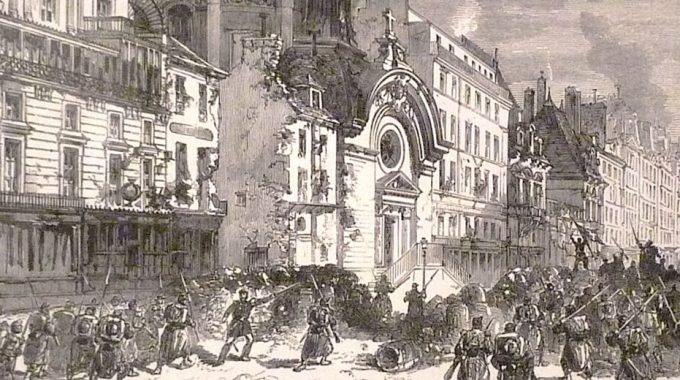
Hope In Turbulent Times
Turbulent times are nothing new for the 400-year-old Temple du Marais, venue for next week’s State of Europe Forum in Paris .
The storming of the Bastille Castle in 1789, triggering the French Revolution, took place just two hundred metres away. That led directly to the closure of the convent of which the domed circular church had been chapel.
Napoleon then decreed the baroque sanctuary to become a place of Protestant worship. The Paris Commune of 1871 saw street fighting at the barricades right outside the church entrance, in the centre of the etching above.
In both world wars, the church’s crypt was used as a bomb shelter. Jews, in the last war, hid from the Gestapo among the organ pipes.
While Jesus did not mean buildings when he said the gates of hell would not prevail against his church, nevertheless the Temple du Marais symbolises the role God calls his people to play in turbulent times: as an ever-present witness raising the standard of truth and offering hope, healing, refuge and reconciliation.
What does this calling mean for us in our fragmented and turbulent Europe today? How can God’s people offer hope, healing and reconciliation to those suffering injustices and inequalities, whether in war-ravaged Ukraine, rural France, debt-stricken Greece, or Brexit Britain?
Rude upset
The Russian invasion of Ukraine has rudely upset many of our complacent presumptions about Europe’s future. Liberal capitalism is not the ‘end of history’. Economic interdependency is no sure safe-guard against aggression from neighbours. The survival of democracy cannot be taken for granted. France’s recent presidential elections, for example, have laid bare a nation fragmented, hurt and angry.
The original peace-making narrative of European integration seemed to have lost its inspirational appeal to younger Europeans, with no living memory of war (or parents’ war stories) and no threat of war. For new Europeans, the last war was not part of their legacy. New narratives about Europe and why it matters were seen to be needed; for example, the argument that government was a God-ordained institution to promote justice: at local, national and European levels.
Suddenly, however, we have found ourselves thrust back to the peace narrative. Ukrainians understand all too clearly why joining the European Union and NATO is the only path to freedom from the grip of a bullying neighbour. But we are conscious too that the institutions set up in the wake of the tragedy of world war to ‘render war unthinkable’ have not totally succeeded. We are ‘back to the drawing board’.
Hence the need for such a forum. What can we learn from what Christian networks did right two generations ago? What was their role in paving the path towards peace? What can we learn from them for our task today?
My own research had made me aware of the role of Catholic networks and the non-affilated Moral Re-Armament movement in the story of post-war forgiveness and reconciliation involving Robert Schuman, Konrad Adenauer and Alcide de Gasperi. I always held that Protestants were sceptical about a European integration process inspired by Catholic ideology.
Challengers
But a new generation of theologians is challenging this perception. They argue that ecumenical Protestant networks were important drivers of early European integration. Clemens van den Berg (Utrecht), Mariette van de Tol (Oxford) and Katharina Kunter (Helsinki) are three from this generation who will join us in Paris and online to help us realise how European politics was also shaped significantly through Protestant theology.
We invite you to join us for this our tenth State of Europe Forum forum, either physically in Paris or online, to wrestle with these questions in the Temple du Marais next Friday evening (6th) and on Saturday (7th). The full programme can be seen on www.stateofeuropeforum.eu, along with the descriptions and links of the eight seminars to be held at 9.00 and 14.00 on Saturday. Contributors’ photos and profiles can also be found on this site.
Our first plenary will attempt to survey the current state of Europe still rebounding from Brexit and the pandemic, and now facing energy shortages and rising inflation due to Russia’s invasion. We will make direct contact in Kyiv with a pastor and a politician for latest updates, before responding in prayer for political and military leaders, for the suffering population and for the churches.
The second plenary on Saturday (11.00) involves a re-reading of the event which set the process of European integration into motion: the Schuman Declaration of May 9, 1950. What is its significance for today in the light of Brexit and the Russian invasion? Gary Wilton, the former representative of the Archbishop of Canterbury in Brussels, draws out guidelines from the declaration for our effective engagement today.
The third and final plenary (16.00) on Saturday asks what is our task then today? How can evangelical Christians contribute to ‘shalom’ in Europe?
Till next week,

This Post Has 0 Comments